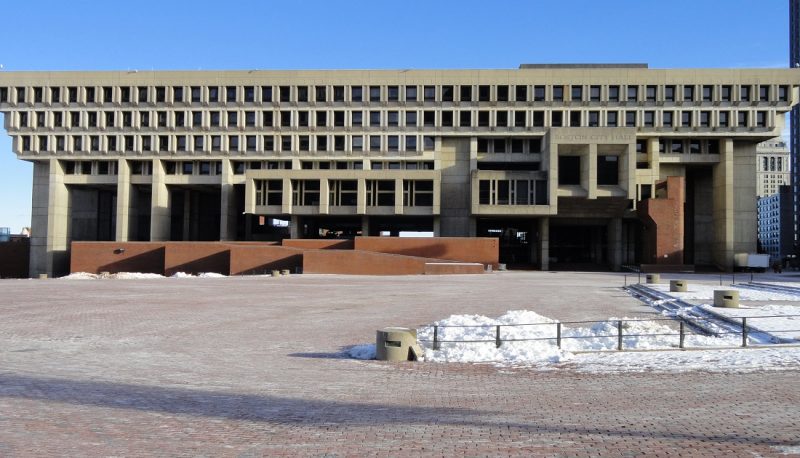The First Circuit could soon decide Shurtleff v. Boston, a case concerning Boston’s denial of a request to fly the Christian flag in front of city hall. In a friend-of-the-court brief filed by People For the American Way Foundation and allied organizations, we make clear that Boston city government flying the Christian flag would breach Church-State separation and exclude the countless Bostonians and other Americans not represented by that religious symbol. The First Amendment and religious freedom tell us that Boston made the right decision. Our introduction follows below. Click here to download a PDF copy of the full brief.
INTERESTS OF THE AMICI CURIAE1
Amici are religious and civil rights organizations whose members include adherents to a wide array of faiths and beliefs, including those that have historically been subjected to religious discrimination and official disfavor. Amici are united in respecting the important but distinct roles played by religion and government in the life of our Nation. From the time of the founding, the Establishment Clause and the religious and philosophical ideals on which it is premised have protected religious freedom for all Americans by ensuring that government does not interfere in private matters of conscience.
A governmental display of the Christian flag in front of city hall is exclusionary to the countless Americans not represented by that religious symbol. More than that, it places a heavy thumb on the scale in favor of one religion over others and over nonreligion. Amici have strong interests in ensuring that religious freedom is protected against such governmental favor or disfavor and that this Court’s jurisprudence remains true to the fundamental principles on which the Religion Clauses of the First Amendment are based.
Amici are:
- Americans United for Separation of Church and State.
- American Humanist Association.
- Anti-Defamation League.
- Central Conference of American Rabbis.
- Freedom From Religion Foundation.
- Jewish Social Policy Action Network.
- Men of Reform Judaism.
- Muslim Advocates.
- National Council of Jewish Women.
- People For the American Way Foundation.
- Reconstructing Judaism.
- Reconstructionist Rabbinical Association.
- Sikh Coalition.
- Union for Reform Judaism.
- Women of Reform Judaism.
INTRODUCTION AND SUMMARY OF ARGUMENT
“The clearest command of the Establishment Clause is that one religious denomination cannot be officially preferred over another.” Larson v. Valente, 456 U.S. 228, 244 (1982); accord, e.g., McCreary County v. ACLU of Ky., 545 U.S. 844, 860 (2005) (government must remain “neutral[] between religion and religion, and between religion and nonreligion” (quoting Epperson v. Arkansas, 393 U.S. 97, 104 (1968)).
By ordaining that civil government and religious authorities operate in separate spheres, the Framers sought to safeguard religious freedom for all: When free from governmental influence and interference, religions may grow organically, letting all worship and pray, or not, according to the dictates of their conscience. And by prohibiting the alignment of secular and religious power, the Framers undertook to “cut off the means of religious persecution.” 3 JOSEPH STORY, COMMENTARIES ON THE CONSTITUTION OF THE UNITED STATES § 1871, at 728 (1833). Thus, the First Amendment does not allow government to express support or preference for any faith or denomination, no matter how modest or benign in intent that expression may seem.
Because religious symbols are powerful expressions of ideas, for many people it would be profoundly affirming to see a flag promoting their own religion flying outside city hall. But to those who do not subscribe to the beliefs represented by the flag, the display instead may send a stigmatizing message of exclusion from the political community. See Santa Fe Indep. Sch. Dist. v. Doe, 530 U.S. 290, 309 (2000). And even for adherents to the favored religion, the government’s use, for its own purposes, of their religious symbol may be demeaning to both their faith and the revered symbol. See id.
The Framers effected a separation of government and religion as the means to ensure enduring religious freedom. As our Nation becomes increasingly pluralistic, that cause is more important than ever. Boston’s policy here not to display religious flags in front of City Hall thus respects the diverse faiths of all city residents, in keeping with the First Amendment and the fundamental freedoms that it safeguards. This Court should therefore reject any invitation to forsake our Nation’s “profound commitment to religious liberty” (McCreary, 545 U.S. at 884) and should instead reaffirm the founding principles and essential protections for religious freedom that have served this country and all its people so well for so long.
